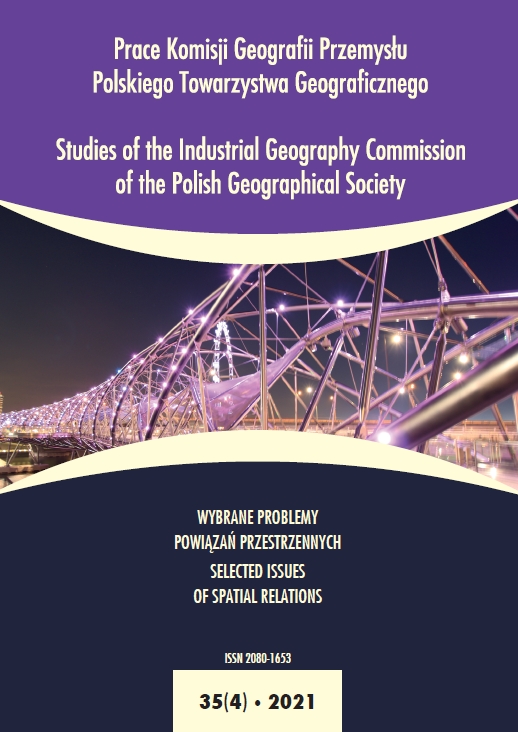Trade relations of the German economy in the world space
DOI:
https://doi.org/10.24917/20801653.354.1Keywords:
German economy, import-export, international trade, trade relations, world economic spaceAbstract
The economy of Germany plays a significant role in the world space and must maintain its position among the dominant leaders. It manifests itself both in terms of the size of the economic potential and in terms of multiple impact on the socio-economic life of individual countries. This idea is referred to in this paper, the aim of which is to present the trade relations of the German economy with other countries in terms of trade turnover. Trade exchange is an important factor influencing the economic activation of a given country. This process is illustrated by the analysis of the international trade exchange of the German economy in 1991-2019. A characteristic feature of the turnover is a positive trade balance in terms of values, and negative in terms of goods weight. The dominant importance in terms of export are products requiring technical expenditure (machinery and equipment, chemicals), while in terms of import, less processed products, mainly fuels, raw materials and foodstuffs. In the world space, there is a very strong concentration of both export markets and import sources. On the one hand, they indicate strong economic ties with the dominant world economies and, on the other hand, seek opportunities for connections with countries with a lower level of economic development, mainly using their raw material resources. In this way, the German economy engages in competitive relations with the dominant countries, both in terms of the possibility of expanding its own sales markets and the possibility of ensuring raw material sources, especially energy and for the electronics industry.
Downloads
Metrics
References
Cornell University, INSEAD, WIPO (2020). The Global Innovation Index 2020: Who Will Finance Innovation? Ithaca, Fontainebleau, and Geneva. Pozyskano z https://www.wipo.int/edocs/pubdocs/en/wipo_pub_gii_2020.pdf (dostęp 06.02.2021).
Dobrzański, P. (2016). Czynniki rozwoju gospodarczego Republiki Federalnej Niemiec w I dekadzie XXI wieku. Barometr Regionalny, 14(1), 53–61.
Główny Urząd Statystyczny. (2020). Rocznik Statystyki Międzynarodowej 2020. Pozyskano z https://stat.gov.pl/obszary-tematyczne/roczniki-statystyczne/roczniki-statystyczne/rocznik-statystyki-miedzyn arodowej-2020,10,8.html (dostęp 06.02.2021).
Globaleconomy.com. (2021). Germany: High tech exports, percent of manufactured exports. Pozyskano z https://www.theglobaleconomy.com/Germany/High_tech_exports_percent_of_manufactured_exports/ (dostęp 06.02.2021).
Kudełko, J. (red.). (2017). Wybrane problemy polityki rozwoju społeczno-gospodarczego. Kraków: Uniwersytet Ekonomiczny.
Kudełko, J., Zioło, Z. (2007) Model funkcjonowania metropolii. Prace Komisji Nauk Ekonomicznych. Polska Akademia Nauk. Oddział w Krakowie, 22, 55–74.
Maciejewski, M., Wach, K. (red.). (2017). Handel zagraniczny i biznes międzynarodowy we współczesnej gospodarce. Księga Jubileuszowa dedykowana profesorowi Stanisławowi Wydymusowi. Kraków: Uniwersytet Ekonomiczny.
Pawlas, I. (2017). Brexit i jego implikacje dla Unii Europejskiej. W: T. Sporek, M. Fronczek (red.), Unia Europejska wobec wybranych zewnętrznych wyzwań XXI wieku. Kraków: Uniwersytet Ekonomiczny.
Popławski, K. (2017). Kapitał ma narodowość. Obawy w Niemczech wobec chińskich inwestycji. Komentarze. Ośrodek Studiów Wschodnich, 230.
Przychodniak, M. (2017). Chińskie plany wzmocnienia partnerstwa z Niemcami. Biuletyn. Polski Instytut Spraw Międzynarodowych, 65.
Sporek, T. (2011). Chińska Republika Ludowa – główny partner handlowy Unii Europejskiej. Studia Ekonomiczne. Uniwersytet Ekonomiczny w Katowicach, 90, 155–164.
Sporek, T. (2014). Uwagi na temat gospodarki niemieckiej w pierwszej dekadzie XXI wieku. Studia Ekonomiczne. Uniwersytet Ekonomiczny w Katowicach, 184, 19–38.
Statistisches Bundesamt – Destatis. (2021). Genesis-Online. Pozyskano z https://www-genesis.destatis.de/genesis/online (dostęp 06.02.2021).
The World Bank (2021). World Bank national accounts data, and OECD National Accounts data files. Pozyskano z https://data.worldbank.org/indicator/NY.GDP.MKTP.CD (dostęp 06.02.2021).
Wysokińska, Z. (2012). Konkurencyjność w międzynarodowym i globalnym handlu towarami technologicznie intensywnymi (high-tech). Studia Europejskie, 1, 127–146.
Zioło, Z. (1982). International Connections of Polish Sulphur Industry. Latin American Regional Conference, IGU Commission on Industrial Systems, Department of Geography F.F.L.C.H. USP, Sao Paulo.
Zioło, Z. (2000). Problemy integracji międzynarodowej przemysłu w procesie zmian systemu gospodarowania. Prace Komisji Geografii Przemysłu Polskiego Towarzystwa Geograficznego, 1, 13–21.
Zioło, Z. (2003). Spatial Dimension of European Integration Processes. Geopolitical Studies, 11, 11–26.
Zioło, Z. (2010). Growth Dynamics of Social Effectiveness of Management in Countries of Central and Eastern Europe. Geopolitical Studies, 16.
Downloads
Published
How to Cite
Issue
Section
License
Copyright (c) 2021 Studies of the Industrial Geography Commission of the Polish Geographical Society

This work is licensed under a Creative Commons Attribution-NoDerivatives 4.0 International License.
Articles are published under the terms of the Creative Commons License (CC BY-ND 4.0; Attribution– NoDerivs).

